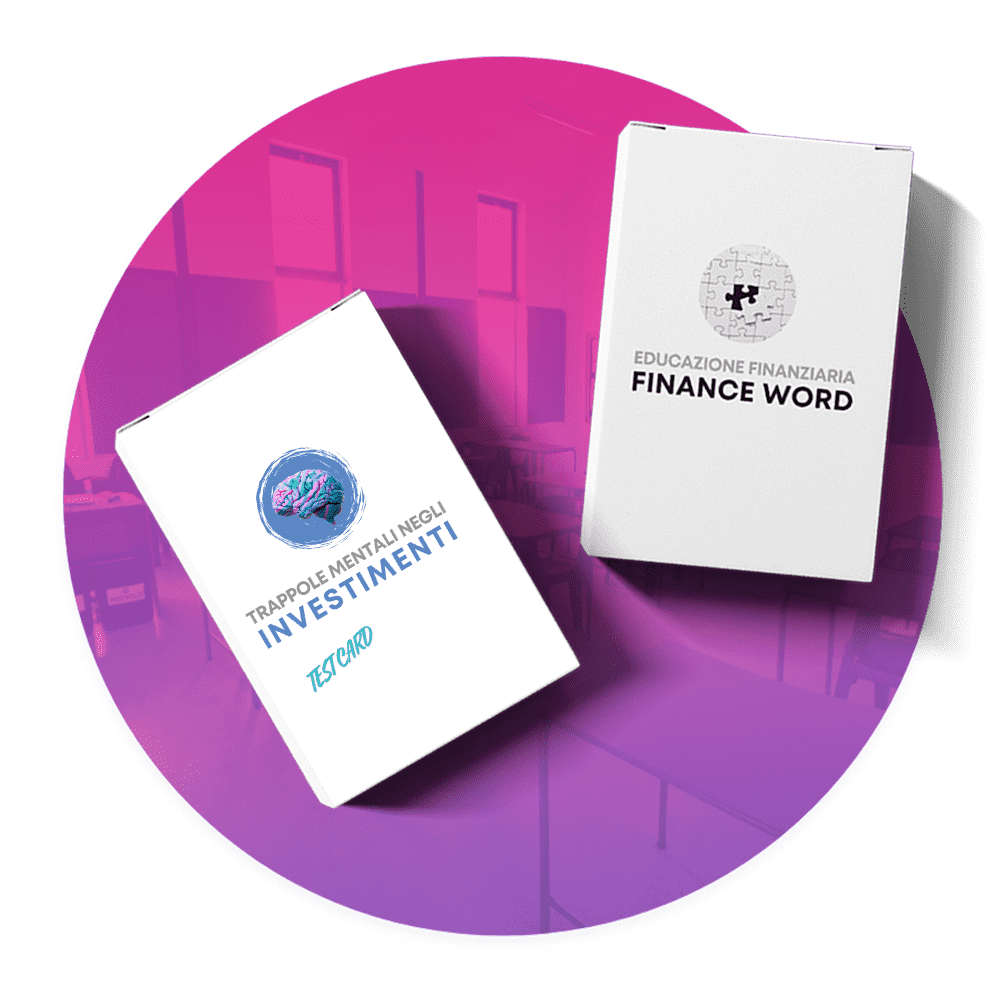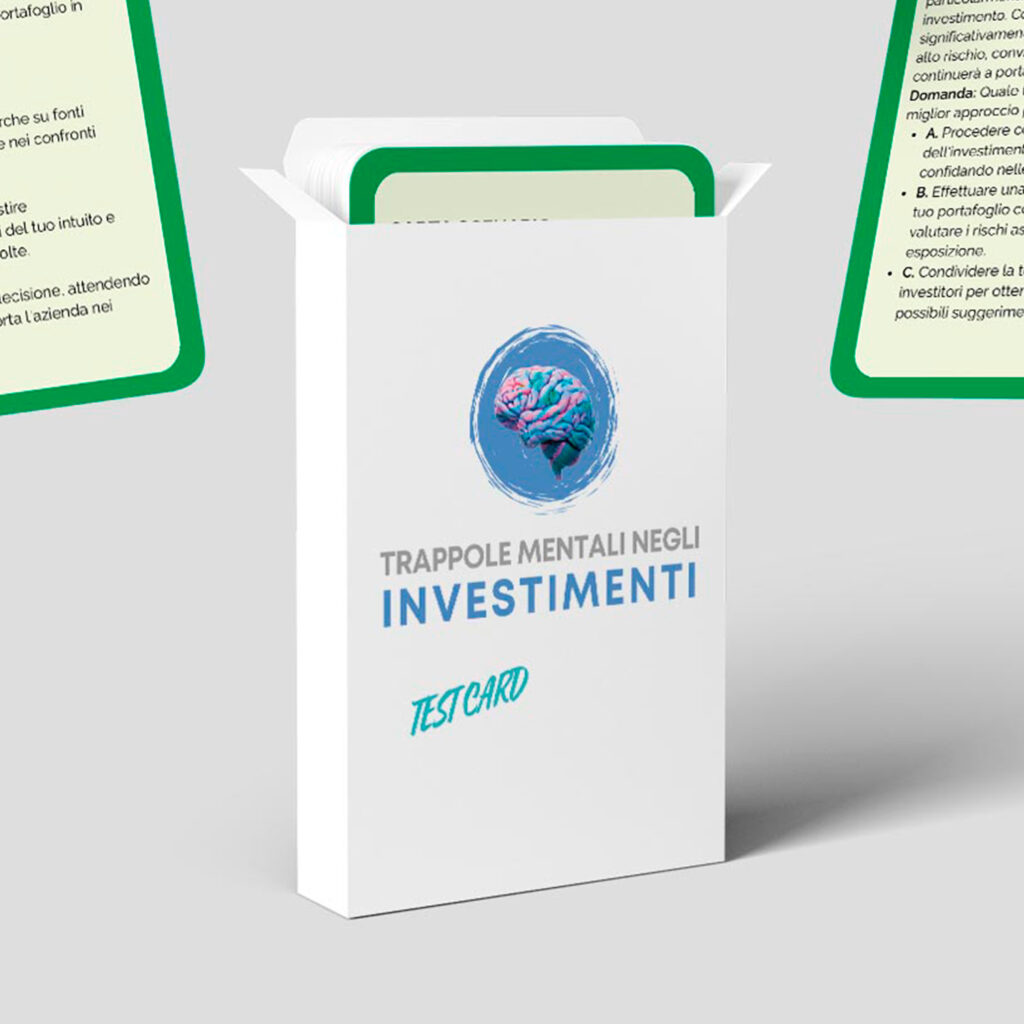Financial Flash Cards
The financial education and behavioral finance flashcards are innovative and practical tools designed to help individuals of all ages develop greater financial awareness by recognizing and overcoming common cognitive errors and biases. These cards offer a visual and interactive approach to learning, making financial concepts accessible and understandable to anyone, regardless of prior knowledge.

Test yourself with our Flashcards



Finance made simple
Understanding financial concepts can seem like a daunting task, but thanks to our “Easy Finance®” method, we make everything simpler and more accessible. It’s a practical and straightforward approach that demystifies personal finance and makes financial concepts available to everyone. Whether you’re looking to save for the future, better manage your budget, or understand how to invest without falling into mental traps, the “Easy Finance®” method gives you the tools and knowledge you need.


Our titles
The educational cards are learning tools that present key information on various aspects of personal and behavioral finance in a compact and easily usable format. Each card is designed to cover a specific concept, such as saving, investing, debt management, or to explore a particular behavioral bias that can influence financial decisions.
These cards can be used individually or in groups, in formal educational settings such as schools and universities, during financial consulting sessions, or even at home as part of family educational activities. The cards not only explain concepts but often include practical examples, reflective questions, and tips to help users apply what they’ve learned to their daily lives.



Why Choose Them
Understanding Errors and Biases: One of the main advantages of the educational cards is their ability to help users recognize and understand the common mistakes and biases that influence financial decisions. Many financial decisions are guided by emotional factors or cognitive biases, such as risk aversion, anchoring effect, or confirmation bias. The behavioral cards explore these topics, explaining how such biases can lead to poor financial decisions and how to avoid them. This kind of awareness is crucial for improving personal financial management and adopting a more rational and informed approach.
Visual and Interactive Learning: The educational cards use a visual and interactive format that makes learning more engaging and less intimidating. Information is presented clearly and concisely, often accompanied by images or diagrams that help illustrate the concepts. This approach is particularly useful for those who learn better through visual stimuli or prefer educational materials that can be explored at their own pace. The cards can be used to facilitate group discussions, educational games, or as part of individual exercises, offering a flexible and personalized learning experience.
Developing Financial Skills: In addition to exploring behaviors and biases, the educational cards are a powerful tool for developing essential financial skills. The cards cover crucial topics such as budgeting, saving for long-term goals, understanding interest rates, and evaluating investment risk. Through practical examples and applicable advice, the cards help users make more informed and strategic financial decisions, improving their ability to manage their finances effectively and responsibly.
The best choice for you
Do you want a custom solution or personalized product?
Frequently Asked Questions
Financial education is the process of learning and understanding how to manage money effectively. It includes knowledge about saving, investing, debt management, budgeting, and long-term financial planning. The goal is to develop skills that enable individuals to make informed and responsible financial decisions.
Financial education is essential because it helps people better manage their money, avoid financial pitfalls, and plan for the future. Good financial knowledge can prevent issues such as excessive debt, lack of savings for emergencies or retirement, and improve overall economic well-being.
Everyone, regardless of age, social status, or income, can benefit from financial education. Young people can learn to manage their first earnings and savings, while adults can enhance their financial planning and investment skills.
What are the main topics covered in financial education?
Financial education covers a wide range of topics, including:
• Budgeting: How to create and maintain a budget to manage income and expenses.
• Saving: The importance of saving money and strategies to do so.
• Investing: The basics of investing and how to grow your capital over time.
• Debt Management: How to avoid, manage, or reduce debt.
• Planning for the future: How to financially prepare for future events, such as retirement or buying a house.
There are several resources available to improve financial education, including books, online courses, workshops, and financial advisors. Additionally, many banks and organizations offer free financial education programs.
Financial education provides the knowledge and skills to manage money independently, while financial consulting involves receiving personalized advice from a certified professional registered in the financial advisors’ registry.
A good level of financial education contributes to greater economic security and reduces stress related to financial problems. Knowing how to manage money enables more conscious decision-making, improving quality of life and the ability to achieve financial goals.





